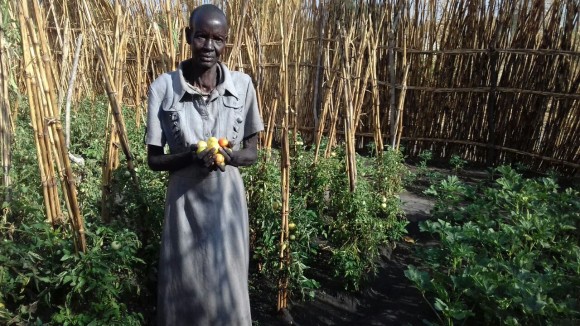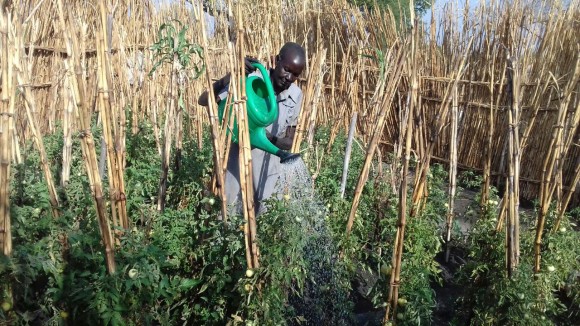Decades of conflict have displaced thousands of people in South Sudan and left many homeless and without hope, while reducing their capacity to cope with recurrent climate change induced natural hazards that impact the country.
Prolonged dry spells, unpredictable rainfall patterns causing excessive flooding, impassable roads during rainy seasons, rising market prices, limited income opportunities and continued currency depreciation affects traders’ ability to supply food and the capacity of families to feed themselves. Families face serious difficulties in meeting their daily food consumption requirement, and rely heavily on humanitarian agencies to find food. Malnutrition is impacting more and more families: 4.8 million people in South Sudan are facing food shortages, with 15 percent of the population malnourished, according to UNICEF. In some areas, this number is reaching 33 percent of the population.
Climate smart techniques for agriculture, livestock, natural resource management and livelihoods diversification: the BRACED consortium
ACTED teams in South Sudan are mobilised to tackle food insecurity through the Building Resilience and Adaptation to Climate Extremes and Disasters (BRACED) consortium programme funded by DFID: under BRACED, ACTED, Concern Worldwide, FAO and The Sudd Institute are working together in South Sudan to build the resilience of flood and drought prone communities in Northern Bahr al Ghazal and Warrap states. This BRACED consortium project enables to support over 375,000 people.
Coping with droughts and floods, building resilience to climate change induced shocks and stresses, improving livelihoods
The program focuses on building the capacity and skills of the agro pastoralist communities to implement climate smart practices, diversify their livelihoods, and anticipate, absorb and adapt shocks and stresses at personal, household and community levels. Through these activities, the ultimate purpose is to enable communities to identify hazards, mitigate risks and establish disaster information sharing and improve their own coping strategies.
Through the BRACED consortium, ACTED has been implementing a resilience project in Warrap state for the last two years. Warrap state is affected by recurrent droughts and flooding, with a heavy impact on food security and livelihoods of the populations in the region.

A multilevel humanitarian response for improved climate resilience
Since the start of 2017, ACTED works with 54 Agro Pastoral Field Schools groups, including 27 groups formed in 2016, 27 Village Savings and Loan Association groups and seven natural resource management committees. The programme includes several levels of response:
- Enhancing good practices to increase natural resource management, in particular land and forest resources to improve the quantity and quality of grazing land, firewood and fruit gathering;
- Training vulnerable populations on better farming practices, which will enable them to acquire good agricultural skills for improved vegetable growing and to protect their assets, while ensuring productivity and livelihoods can resist the stresses and shocks induced by climate change;
- Providing livestock extension services to support agro pastoralist populations in coping with floods, droughts and consequent desertification that leads to losses of cattle;
- Supporting rural financing by using village network models like Agro Pastoral Field Schools, Community Agricultural extension Workers and Village Savings and Loan Associations (VSLA, groups of people who save together and take small loans from those savings) that help their members practicing income generating activities.
The BRACED consortium works along with the Government Ministries: the Ministry of Environment as the focal agency for climate change in South Sudan; the Ministry of Agriculture and Forestry, as the key Ministry responsible for food security; and the Ministry of Humanitarian Affairs and Disaster Management, which is currently developing the national policy on disaster management and analysing climate risks that South Sudanese citizens deal with.

Adaptation of farming practices and their benefits: Monica’s story
Monica is one of the beneficiaries of the BRACED programme trainings and activities. She is a member of the Guarria Agro Pastoral Field School and of a Village Savings and Loan Association. Village Savings and Loan Associations (VSLA) are groups of people who save together and take small loans from those savings. The activities of the groups run in cycles of one year, after which the accumulated savings and the loan profits are distributed back to members. The purpose of a VSLA is to provide simple savings and loan facilities in a community that does not have easy access to formal financial services.
I am old but I can hear and see. I learnt a lot of things from our group, like row planting, nursery bed management, vegetables growing, small scale irrigation, pest management and many others, I cannot remember everything.
Monica has applied the knowledge and skills she has learnt from her group to set up her own vegetable garden near a water source. She received tools such as watering cans and hand hoes, and floods and drought tolerant seeds from ACTED. She planted okra, tomatoes, eggplant and other vegetables, and is now harvesting her crops that enable her to generate an own income.
As you can see, I have tomatoes that I have started harvesting and selling every day. And I still have young tomatoes that I will be able to sell, alongside with other vegetables, in the coming days. People come to me every day to buy tomatoes. I have just started selling them, and so far, I already got SSP 1,000 (around $ 10) and I expect to get more. I have used SSP 500 to buy food and kept the rest for emergencies, since I often get sick. I hope to join the saving group as soon as my savings increase. I will keep on growing vegetables. It is a very easy work with quick returns, since the demand for vegetable is high, especially during the dry season, just like now.